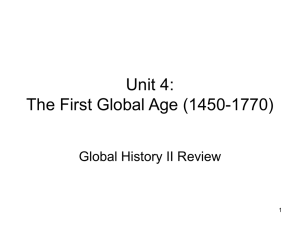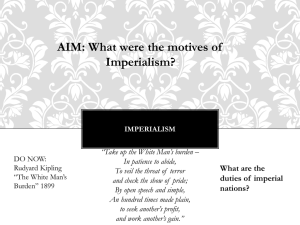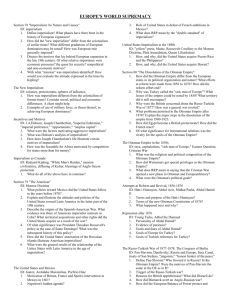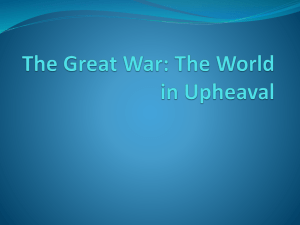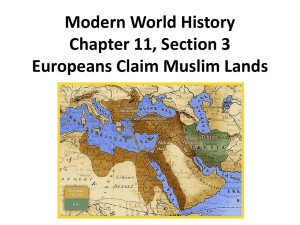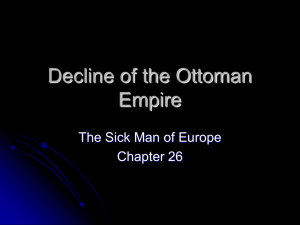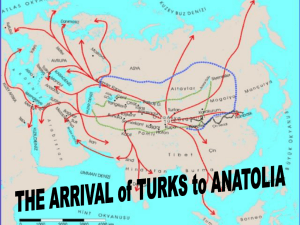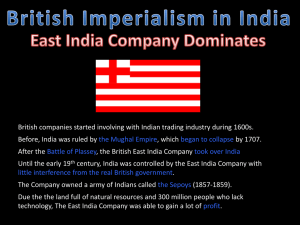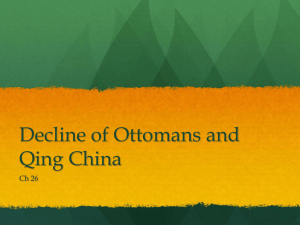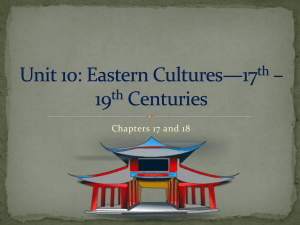CHAPTER 24: Imperialism in Africa, India, and the Middle East
advertisement
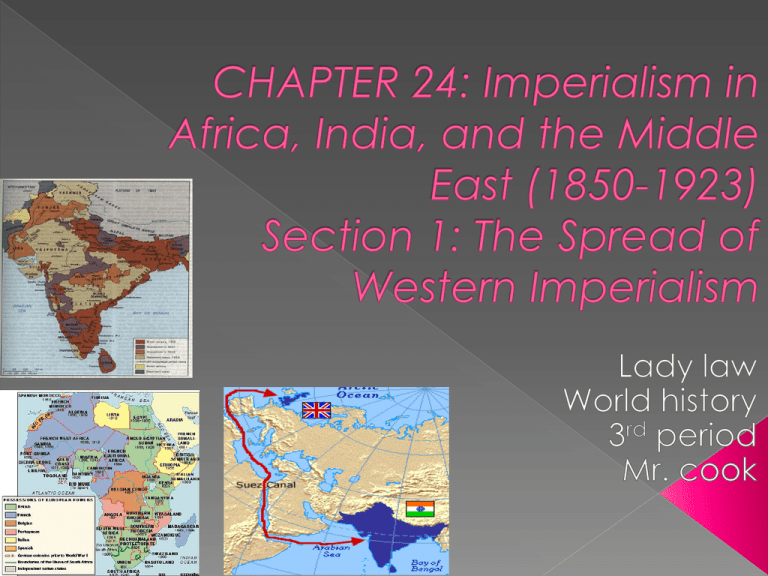
Main Idea ~ In the late 1800s, the Industrial Revolution in Europe and in the United States reached its peak. Industrial Revolution in Full Stride ~ By 1850, Great Britain was the most industrialized nation in the world. Thanks to steamships, goods mass-produced in Britain could be transported worldwide. ~ The Great Exhibition of 1851, the first world’s fair, was held in London, England . ~ France, Belgium, and the United States followed Britain’s industrial lead in the early to mid-1800’s. The Economic Picture ~ The unification of India under British easier by the railroads. rule was made ~ The British began an ambitious program of railway construction in India in the 1850s. ~ As Europeans became a greater force in Asia and Africa, the industries of those places underwent a change. Main Idea ~ Economic, political, and social factors served as important motives for Western imperialism. European Defense of Imperialism ~ Colonialism and imperialism are practices used to establish and maintain control over distant regions. ~ The industrialization of European nations gave them a great advantage over the non-industrialized nations of Asia and Africa. ~ As the Industrial Revolution spread throughout Europe, the need grew for steady supplies of raw materials, such as cotton and rubber. Economics of Imperialism ~Economics was always a major factor in imperialism. ~ Europeans also wanted to develop new markets for the products of their factories. ~ Another important economic factor was the higher profits that could be made from investing money in Africa and Asia. Politics and Imperialism ~ As a driving force for imperialism, politics was probably second only to economics. ~ In the 1600’s, the concerns over balance of power had been confined to the European continent. ~ The European nations set up different types of governments in the areas they controlled. Religion, Culture, and Imperialism ~ Religious and social arguments were often used to support the idea of imperialism. ~ In addition to spreading the Christian word, missionaries promoted education. ~ European writers and politicians spoke of the moral obligation of advanced countries to bring “culture”, “reason”, and “order” to developing regions. Other Factors Favoring Imperialism ~ Scientific curiosity and the urge for adventure also motivated imperialism. ~Social Darwinists adapted some of Darwin’s ideas to human ethnic groups, claiming that Europeans were more “advanced” than other groups and should be expected to rule over such groups. ~ In the end, imperialism had mixed results, some positive and some negative. Lady law World History 3rd History Mr. Cook Main Idea ~ Until the late nineteenth century, most of Africa was unknown to Europeans. African Travels ~ In 1878, British explorer Henry Morton Stanley published a travel book telling of his adventures in Africa. ~As a journalist, Stanley had accepted an assignment from the New York Herald in 1871. ~ Livingstone’s (a British Congregationalist pioneer medical missionary with the London Missionary Society and explorer in Africa). story made good travel reading. Europe Enters Africa ~ The International Congo Association was a private investment company, not a government undertaking. ~ The arrangement with King Leopold(King of the Belgians) was, in effect, a mandate. ~ During the 15- year period after the Congress of Berlin, there was an explosion of colonizing activity in Africa. Main Idea ~ Starting in the 1870’s, European nations competed with each other to establish colonies in Africa. Egypt and North Africa ~ During the mid-1800s, Egypt was a semi- independent state within the Ottoman Empire. ~ The canal was one of the most important waterways in the world, linking the Mediterranean Sea with the Red Sea. ~ The French government’s reaction to these events shows European rivalry for colonies in the late 1800’s. Africa South of the Sahara ~ The area of Africa south of the Sahara is nearly as large as the continent of North America. ~ In East Africa, the major colonizers were Britain and Germany. ~ Italy and Portugal also played important roles in imperialism. Lady law World History 3rd History Mr. Cook Main Idea ~ Beginning in the 1600s, British interest and influence in India grew steadily, and by the late 1850’s, Great Britain had consolidated it’s rule in a large part of the country. The East India Company ~ The Portuguese and the Dutch led European exploration of South Asia and the East Indies in the 1500s. ~ In the early 1600s, much of Northern India had been under control of the Mughals. ~ In 1757, an officer of the East India Company, Robert Clive, took advantage of the Mughal decline. British Control of India ~ Over time, the British Parliament became concerned about the activities of the East India Company and the power it held. ~ During the first half of the nineteenth century, Great Britain steadily expanded its control over India. ~ One of the most dynamic administrators of India was Lord Dalhousie. Main Idea ~ Even as India Became the centerpiece of the British Empire, nationalism was growing and would eventually lead to Indian independence. Indians Fight for the Independence ~ By 1857, many Indians had become resentful of outsiders controlling their country. ~ An incident ( Murder of a fellow Indian) arose that led the Indians to rebel. ~ When the sepoys refused to load their new rifles, they were punished by their British commanders. Indians Under the Raj ~ Although the British government made allies of the native Indian rulers, it did not interfere with everyday life in India. ~ In 1835, the British had decided to make English the language of education and government in India. ~ By the end of the nineteenth century, a new generation of Indian industrialists such as, Jamshed N. Tata made a fortune in cotton. The Indian National Congress ~ As education for Indians increased their opportunities, a growing movement for independence took shape. ~ A few years after the Indian National Congress was founded, a young Indian named Mohandas K.Ghandi left India to study law in London. ~ After returning to India in 1915, Ghandi became India’s most eloquent spokesperson for independence from Great Britain. Main Idea ~ The Ottoman Empire, which included vast territories on thee continents, gradually declined in the 1800’s Origins and Geographic Extent of the Ottomans ~ In the late 1300’s, the Ottomans had conquered parts of the Balkans in Eastern Europe. ~ After 1453, western Europe became more involved in the policies and plans of the Ottoman Empire. ~ The Ottoman rulers were Muslim, a fact that alarmed Christian Europe. Decline of the Ottoman Empire ~ There were many reasons why the Ottoman Empire began to decline. ~ Competition for the strategic location of the Ottoman Empire was another key to why the empire went into decline. ~ For years, the Russian government made several unsuccessful attempts to gain access to routes such as Mediterranean Sea, Atlantic and the Black Sea . Attempts at Reform ~ After the Crimean War, the Ottoman Government attempted a series of sweeping reforms. ~ In the 20 year period from 1856 to 1879, a serious effort was made to save the empire from further decline. ~ The government also guaranteed property rights for all citizens of the empire. Main Idea ~ Despite efforts at reform, the Ottoman Empire disintegrated and finally collapsed around 1920. A Harsh Ottoman Ruler ~ In 1876, a new Ottoman ruler came to power. ~ A year later after Abdulhamid II became ruler, the first Turkish parliament met. ~ This sudden turn of events stunned those who were working to modernize and reform the empire. The End of the Ottoman Empire ~ Russia wanted the Ottoman Empire to completely break apart. ~ In 1877, Russia declared war on the Ottoman Empire. ~ The terms of the treaty were so favorable to Russia that the western European states became alarmed. The Treaty of Berlin ~ The Congress of Berlin resulted in -- a new treaty that avoided war between countries in western Europe and Russia- at least for the movement. ~ Germany gained no new lands from the treaty( the treaty of Berlin). ~ In the five- year period 1908- 1913, the Ottoman Empire suffered more losses.
